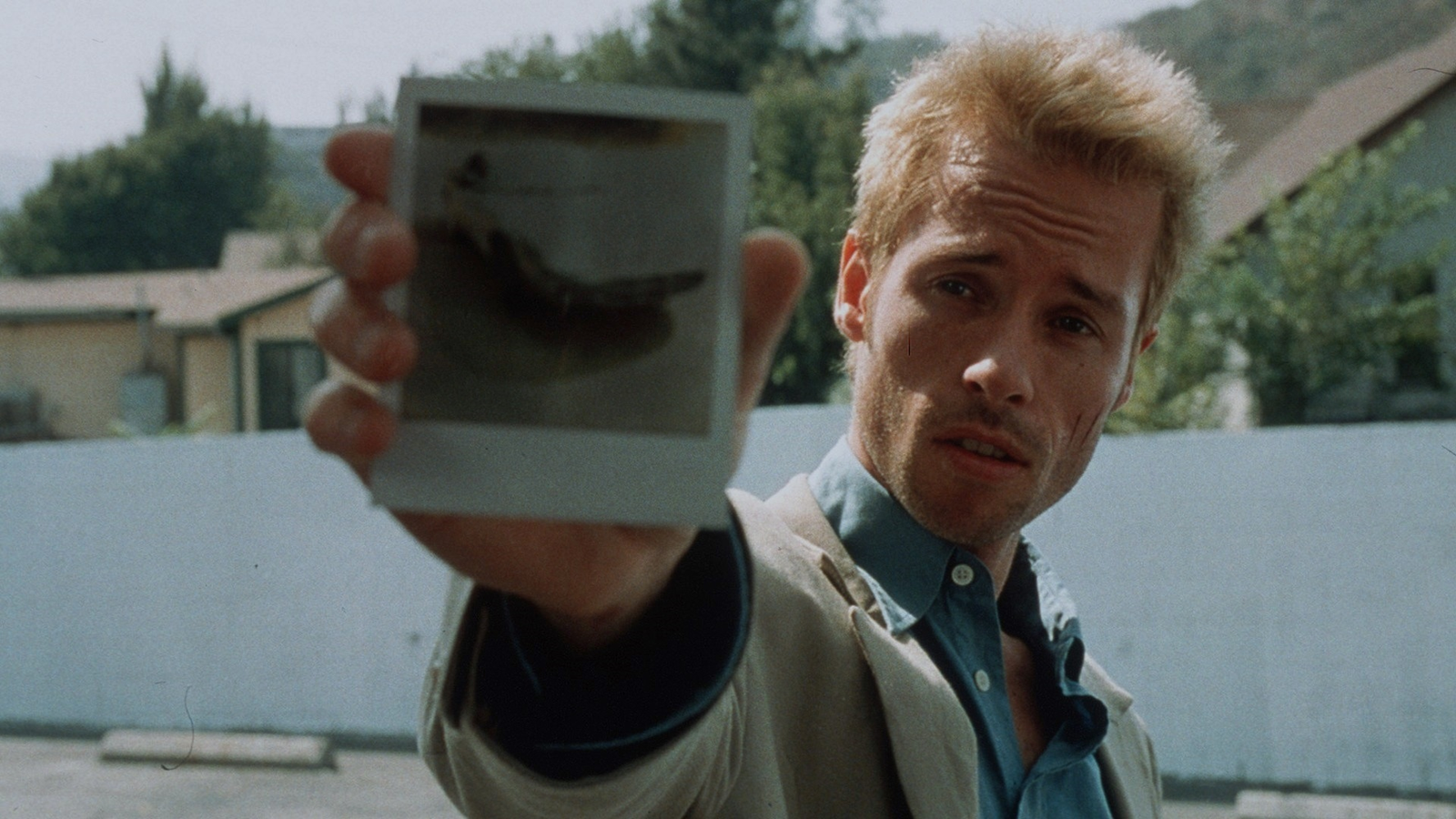Table of Contents
Introduction: Understanding Memento
In the labyrinthine narrative of Memento, Christopher Nolan crafts a mind-bending journey into the depths of memory and identity. As the protagonist struggles with short-term memory loss, the audience is invited to experience the world through his fragmented perception. This film is not just a suspenseful thriller; it serves as a profound exploration of the psychological complexities that govern our understanding of self.
Memento Explained delves into the intricate layers of human cognition, challenging viewers to question what constitutes reality when memory is unreliable. The characters’ quests for truth and closure mirror our own existential inquiries, making the film a poignant reflection on the nature of human experience.
Through a careful analysis of the psychological and philosophical dimensions of Memento, we uncover how its unique storytelling enhances our understanding of memory’s role in shaping identity and reality. Join us as we unravel the enigma behind Nolan’s cinematic masterpiece.

The Psychology of Memory and Identity
The Nature of Memory
In Memento, the protagonist Leonard Shelby grapples with the concept of short-term memory loss, which serves as both a narrative device and a philosophical inquiry into the essence of memory itself. His condition, a result of a traumatic event, raises profound questions about how much our memories define us. Memory is not merely a repository of past events; it is intricately linked to our sense of identity. When Leonard loses his ability to form new memories, he loses a significant part of himself.
The film presents a unique perspective on the reliability of memory, showcasing how subjective recollections can distort reality. Cognitive psychology suggests that memory is reconstructive, greatly influenced by emotion and context. The audience witnesses this dynamic as Leonard experiences conflicting memories, leading to confusion and desperation.

Identity in the Absence of Memory
The interplay between memory and identity raises critical philosophical questions. If our memories shape who we are, what happens to identity when those memories are inaccessible? Leonard’s struggle illustrates the fragility of identity in the face of cognitive impairment. He relies on tattoos and Polaroid photographs to anchor his understanding of who he is and what he must do.
This externalization of memory blurs the line between self and other. Leonard’s identity becomes dependent on the interpretations of people around him and the physical records he creates. His journey reveals the paradox of striving for a coherent identity while being trapped in a cyclical loop of fragmented memories.
The Role of Emotion
Emotion plays a substantial role in how memories are formed and recalled. In Memento, Leonard’s emotional experiences influence his motivations and actions. For instance, his deep-seated desire for revenge against the man who attacked him colors his perception of events, prompting him to manipulate his memories to fit his narrative.
Psychological studies show that strong emotions can enhance memory retention, but they can also distort the truth. Leonard’s quest for vengeance is intertwined with selective memory, highlighting how emotions can lead to biased recollections. This distortion raises questions about the authenticity of his actions and the validity of his quest for truth. As viewers, we are compelled to ponder: Is Leonard truly seeking justice, or is he simply trying to construct a narrative that allows him to cope with his loss?
Ultimately, Memento invites us to consider the complex relationship between memory, identity, and emotion and challenges us to reflect on how these elements shape our understanding of ourselves and our past.
The Philosophical Implications of Memento
Reality and Perception
Memento serves as a compelling exploration of the philosophical concepts of reality and perception. The film challenges viewers to question the nature of truth, suggesting that reality is often subjective and influenced by individual experience. Leonard’s memory loss distorts his grasp of reality, leaving him to navigate a world where the past is always in flux. This aligns with philosophical skepticism, which posits that our perceptions of reality may be unreliable, raising the question: How can we trust our experience of the world when memory can be so flawed?
The nonlinear narrative structure of Memento further emphasizes this theme. By presenting events in reverse chronological order, Nolan creates a disorienting effect that mimics Leonard’s disjointed perception. This narrative technique forces the audience to piece together the story much like Leonard, highlighting the complexity of understanding the truth when it is shrouded in confusion and selective memory.

The Problem of Free Will
Another critical philosophical implication found in Memento is the notion of free will. Leonard’s struggle with his identity and memory raises significant questions about autonomy and choice. As he relies on external methods to remember his past and navigate his present, it becomes evident that his perceived agency is hindered.
Is Leonard truly in control of his actions, or is he merely a puppet to his fragmented memories and emotional drives? The film presents a paradox where the quest for revenge becomes an obsession, suggesting that the desire for justice can manipulate one’s actions, potentially leading them away from true agency. The implications of this notion resonate with existential philosophy, particularly the ideas of Jean-Paul Sartre and other existentialists who argue that human beings are defined by their choices amidst the chaos of existence.
The Search for Meaning
Leonard’s relentless pursuit to uncover the truth about his wife’s murder reflects a deeper philosophical quest for meaning in a seemingly chaotic and uncaring world. This search mirrors the existential crisis many individuals face in their own lives. The film poses the unsettling question of whether meaning can exist in a state of perpetual uncertainty.
As Leonard collects clues and tattoos key information on his body, the act of creating a narrative—however flawed—becomes a means of coping with despair. This raises essential questions about the nature of meaning itself: Is it something intrinsic to our existence, or is it a construct we create to make sense of our experiences? In Memento, the struggle for meaning amidst confusion serves as a poignant reminder of the human condition, encapsulating the desire for clarity in a world often devoid of it.
Through these philosophical explorations, Memento invites viewers to grapple with the complexities of reality, free will, and the search for meaning, ultimately leaving us with more questions than answers.
Ending Explained: Decoding the Final Revelations
The Revelation of Truth
The conclusion of Memento is a masterclass in narrative ambiguity and unexpected twists. As the film unfolds, viewers witness Leonard Shelby meticulously piecing together his fragmented memories to seek revenge for his wife’s murder. The ending, however, forces us to reconsider the very truth Leonard has been pursuing. In the climactic moments, Leonard discovers that the man he believes to be his wife’s murderer, John G., may not be the true antagonist. The revelation that he has already killed the real culprit adds a layer of complexity to his quest for vengeance.
This pivotal twist prompts audiences to question the reliability of Leonard’s memories and the motivations behind his actions. In the final scene, as Leonard decides to write down the name “John G.” to perpetuate his quest for revenge, we understand that he has become trapped in a cycle of self-deception, instigating a perpetual loop of violence and pursuit of a truth that may no longer matter.

Self-Deception and Identity
Leonard’s ultimate act of self-deception lies in his willingness to forget the truth in favor of a simpler narrative. Throughout the film, he grapples with the complexity of his identity as he defines himself through his past experiences. By tattooing the information regarding his wife’s murder on his body, he tries to create a semblance of identity anchored in revenge. The decision to consciously ignore the truth reveals a disturbing facet of his character: the ability to manipulate his own memories to maintain a sense of purpose and identity.
As Leonard embarks on this cyclical quest, the audience is left contemplating the consequences of his choices. The ending underscores the idea that identity is not just built from memories, but also shaped by the narratives we tell ourselves. By choosing to forget the truth about his own actions, Leonard not only avoids facing his guilt but also commodifies his pain into a singular narrative of revenge.
The Cycle of Violence
The final moments of Memento highlight the cyclical nature of Leonard’s quest, emphasizing the futility of his actions. By choosing to eradicate any resolution, the film presents a bleak landscape of existential dread. The audience is left with the chilling implication that Leonard will continue to pursue revenge endlessly, setting off a chain reaction that perpetuates violence and suffering.
The conclusion resonates with broader philosophical questions about the nature of justice and the consequences of living in a fragmented state of mind. Leonard’s journey becomes an allegory for how the desire for revenge can consume and distort one’s identity, leading to a cycle of retribution that becomes all-consuming. This narrative choice reinforces the film’s overarching themes of memory, identity, and the philosophical implications of truth and perception, leaving viewers entrenched in contemplation long after the credits roll.
In this way, Memento challenges our understanding of closure, compelling us to reflect on how our memories and narratives shape our realities, ultimately making us question who we truly are.
Visual and Narrative Techniques in Memento
Nonlinear Narrative Structure
One of the most defining aspects of Memento is its ingenious nonlinear narrative structure. The film unfolds in a dual storyline, alternating between black-and-white scenes that progress chronologically and color scenes presented in reverse order. This approach immerses viewers in Leonard Shelby’s fragmented experience, allowing them to feel the disorientation and confusion of his memory loss.
By employing this technique, Christopher Nolan effectively places the audience in the protagonist’s shoes, forcing them to piece together the narrative much like Leonard himself. This disjointed storytelling mirrors the unpredictability of human memory, which is often selective and repetitive. As the audience contemplates the plot while navigating the complexity of Leonard’s journey, they become active participants in unraveling the mystery—a technique that amplifies engagement with the film’s themes.

Symbolism and Motifs
Nolan’s use of visual symbolism adds depth to Memento, enriching the viewer’s understanding of memory and identity. The recurring motifs of photographs and tattoos serve as tangible reminders of Leonard’s past, representing the fragility of memory and the lengths he must go to in order to maintain a sense of self.
The Polaroid photographs that Leonard takes not only document crucial information but also symbolize the fleeting nature of memory. Each snapshot captures a moment in time, juxtaposing the permanence of the photograph with the impermanence of Leonard’s recollections. Similar to his tattoos, which become physical manifestations of his abused psyche, these visual elements emphasize the struggle to capture and preserve the essence of self.
Cinematic Techniques
From a cinematic perspective, Nolan employs a range of techniques to enhance the storytelling and evoke an emotional response. The film’s cinematography utilizes a muted color palette, which reflects the bleakness of Leonard’s reality and the emotional weight he carries. Lighting contrasts are employed to highlight key moments and the duality of memory—illuminating the truth while shrouding it in darkness.
The score, composed by an instrumental arrangement, underscores the tension and urgency of Leonard’s pursuit of answers while instilling a sense of despair. By carefully orchestrating the auditory elements, Nolan heightens the emotional stakes, drawing viewers into Leonard’s psychological turmoil.
The use of jump cuts further emphasizes the fragmented nature of memory, disrupting the smooth flow of time and echoing the instability of Leonard’s perception. These stylistic choices create a film that is at once visually compelling and deeply philosophically resonant, seamlessly embodying the themes of disorientation and the quest for truth.
Through these visual and narrative techniques, Memento not only tells a story about memory and identity but also invites the audience to experience and reflect on the complexities of human cognition and perception.

Book Recommendations for Themes in Memento
To deepen your understanding of the themes explored in Memento, consider delving into these thought-provoking books that address memory, identity, and the nature of truth.
“Being No One: The Self-Model Theory of Subjectivity” by Thomas Metzinger
This groundbreaking book explores the nature of consciousness and the concept of self. Metzinger presents the self-model theory, which aligns closely with the philosophical inquiries found in Memento, particularly concerning how memory contributes to one’s identity. The insights offered can illuminate Leonard’s struggle with his sense of self in the film.
Buy Being No One here
“The Memory Illusion: Remembering, Forgetting, and the Science of False Memories” by Julia Shaw
In this compelling book, psychologist Julia Shaw examines the fallibility of memory. She delves into the mechanics of how memories are constructed, distorted, and sometimes entirely fabricated. Shaw’s exploration of the ways our memories can mislead us resonates with Leonard’s experiences in Memento, where the lines between fact and fiction become increasingly blurred.
Buy The Memory Illusion here
“The Body Keeps the Score: Brain, Mind, and Body in the Healing of Trauma” by Bessel van der Kolk
This influential work offers insights into how trauma affects the psyche and memory. Van der Kolk discusses the interplay between trauma and identity, making it a pertinent read for understanding the psychological implications present in Memento. The book’s exploration of personal narratives can also enhance your appreciation of how Leonard constructs his reality.
Buy The Body Keeps the Score here
“Eternal Sunshine of the Spotless Mind: The Screenplay” by Charlie Kaufman
While technically a screenplay, this text offers a profound meditation on memory and love. Kaufman’s work dives into themes of loss, forgetting, and the impact of memories on relationships, paralleling Leonard’s journey in Memento. This narrative prompts readers to consider the value and pain of memories in shaping human connection.
Buy Eternal Sunshine of the Spotless Mind here
“An Unquiet Mind: A Memoir of Moods and Madness” by Kay Redfield Jamison
In this compelling memoir, psychiatrist Kay Redfield Jamison shares her struggles with bipolar disorder, providing a unique insight into the complexities of mental health. Her narrative touches on themes of identity and reality, echoing the psychological undertones in Memento. This book highlights the subjective experience of memory and self, aligning with Leonard’s plight to reconcile his fragmented identity.
Buy An Unquiet Mind here
Conclusion: Reflecting on Memento’s Impact
In delving into the intricate layers of Memento, we uncover not only a thrilling narrative but also a profound exploration of psychological and philosophical themes. The film challenges our understanding of memory and identity, compelling us to reflect on how our perceptions shape our realities.
Memento Explained highlights the fragility of truth and the complexities of human cognition, revealing the desperation of a man navigating his own mind. As we dissect the narrative techniques and visual storytelling employed by Christopher Nolan, it becomes clear how deeply intertwined these elements are with the central themes of the film.
Ultimately, Memento serves as a mirror, reflecting our own struggles with remembrance, identity, and the search for meaning. It encourages viewers to consider the implications of memory on their lives, making it a truly unforgettable cinematic experience.
Take a look at all our in-depth reviews here.




